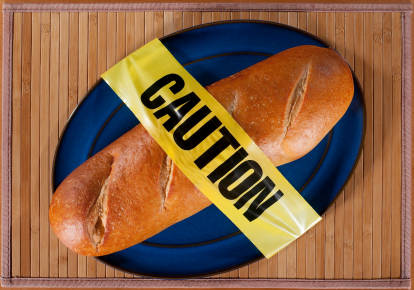Lose Weight > Common Sense To Lose Weight > Common Sense Article > Crash & Burn? How Quick-Fix Diets Affect Your Body
Crash & Burn? How Quick-Fix Diets Affect Your Body
 These days, instant gratification is the name of the game. It's not uncommon to crave a quick and easy fix for a complicated task. And, when weight loss and maintenance are the goals that many people strive for, the idea of a crash diet may seem all too appealing. But when severe energy restriction works against the body's natural biological adaptations, it can be bad news for successful weight loss.
These days, instant gratification is the name of the game. It's not uncommon to crave a quick and easy fix for a complicated task. And, when weight loss and maintenance are the goals that many people strive for, the idea of a crash diet may seem all too appealing. But when severe energy restriction works against the body's natural biological adaptations, it can be bad news for successful weight loss.A crash diet is motivated by tomorrow's number on the scale—not the lifelong effect it can have on the body. It's a world away from mindful energy restriction with a focus on good-for-you nutrients. While it may seem like a small tradeoff for a period of weight loss, repeatedly crash dieting can do a real number on your health. Whether you're stuck in a cycle of crash diets or have considered diving into one, take some time to learn about the damaging aftermath—it may be just what you need to get yourself back on a healthy track.
Crash Diets 101
A crash diet is exactly what it sounds like: a sudden restriction of food that shocks your body. It is often characterized by severe limitation through the elimination of certain food groups (such as carbohydrates) or an emphasis on just a few types of food (such as the "grapefruit diet") in order to quickly lose weight. But when your body depends on a balanced diet of vitamins and nutrients, dieting restrictions such as these are a fool-proof summons for a weight loss disaster.
"It's the exact opposite of a balanced, healthy lifestyle," explains Dr. Caroline Cederquist, M.D., creator of bistroMD. Extreme food restriction can send your body into a panic since it doesn't understand the difference between diet and starvation. Your body will think you're experiencing the latter, thereby stimulating its protection mode to save fuel reserves. It is your system's natural way of making sure that your body keeps moving and grooving.
Within 24 hours of starting a crash diet, your carbohydrate reserve is the first to go, according to "Biochemistry." Low blood sugar levels will leave you feeling groggy and irritated. Water loss will disguise itself as shedding pounds. Eventually, your body targets your protein stores, increasing the risk for heart, liver and kidney complications. Once it gets to the fat reserves, adipocytes, or fat cells, become stressed, impacting neurotransmitters that control satiety. This culminates in a greater appetite as your body tries to work with the perceived starvation.
Sarah Koniarski, R.D., L.D. and a physician assistant student at Pace University, shares that your body attempts to conserve energy by adjusting your metabolism. Brain pathways begin to zero in on mechanisms that regulate energy balance. Basically, your body has a way of doing things—and crash dieting is not part of the plan.
Ultimately, the more you don't eat, the more energy your body actually needs. It's a tricky concept that many crash dieters may not know when they start. At the end of the day, your body won't know that you are purposely depriving it from essential nutrients. Instead, it tries to protect you by meddling with the usual ebb and flow of your metabolism.
Your Body When It Crashes
When the body repeatedly experiences a stressful situation, the impacts accumulate over time. As a result, the repercussions of a crash diet can last longer than you think. "The loss of muscle is an important physical aftermath of crash diets," notes Cederquist. And when that muscle is responsible for most of our body's metabolic rate, metabolism inevitably slows down after a crash diet.
When metabolism is negatively influenced, it becomes more difficult to lose weight, which is the goal of the crash diet in the first place, right? In fact, weight gain is actually more likely once the diet stops. The Obesity Action Coalition specifies that 40 percent of crash dieters rebound after diet cessation. Obesity Reviews attributes this to the disruption of the metabolism's homeostasis, something that could lead to overeating down the line.
SparkPeople member GOOZLEBEAR has experienced this cycle first hand. "I think I've tried every crash diet ever invented," she recalls. "And while I had a lot of short-term weight loss, the pounds never stayed off."
Repeated crash dieting can also amplify your risk for chronic conditions. The "International Journal of Obesity" links extreme protein degradation to cardiovascular stress, increasing the risk for irregular heartbeat and stroke. The strain on fat reserves can also aggravate fat tissues and contribute to diabetes, according to the American Diabetes Association. Moreover, a study featured in the "American Journal of Physiology" mentions that continuous crash dieting can disrupt gut bacterial balance, negatively impacting digestion and immunity. Digestion problems may even linger in between periods of crash dieting.
"The risk for gallstones also intensifies," adds Koniaraski, who specifies that this is a result of fat breakdown and cholesterol secretion into the bile. Chronic crash diets can also lead to osteoporosis as the body taps into the bone's calcium stores. Clearly, a crash diet can impact more than just the number on the scale.
Even your mental health can take a hit. "When [caloric or nutrient] intake doesn't meet the needs of daily function, you're more likely to lose your mental edge," states Koniarski. Consequently, it may be difficult to perform daily activities without feeling distracted or irritable. This also escalates the risk of making mistakes at work and lashing out at loved ones. There's a reason why the word "hangry" exists, after all.
Aside from hindering your A-game, a crash diet can also disrupt emotional stability. According to Koniarski, the complexity of crash diets can make people lose confidence in their ability to drop weight. "It's common to feel a sense of failure from lack of goal achievements," she says.
It can also mess with your perception of healthy weight loss from the get-go. Koniarski notes that repeatedly following strict, rigid diets can lead to a disruption of normal eating habits. This can, in turn, lead to food preoccupation and overeating—two major factors in the development of eating disorders. Ultimately, crash diets place unhealthy stress on the act of eating, taking away from the enjoyment and nourishment that food can—and should—provide.
The Lowdown on Long-Term Weight Loss
This is where gradual, long-term weight loss comes into play. While it won't offer an instant solution, it is the safest option for your body and brain. It's also a crucial ingredient in the recipe for success. A study from the American Journal of Physiology reports that regular strategies maintained over time can prevent biological adaptations that lean toward rebound and weight gain.
Plus, habits are more likely to stick when they're developed over time. According to research, it's said that it takes 66 days to form a new habit, considerably more time than most people invest in a crash diet. When you are willing to put in the time, you're rewarded with consistent habits that won't waver over time.
Cederquist also stresses the importance of the relationship between muscle and metabolism. "When you have more muscle, you burn calories faster," she explains. This emphasizes how crucial regular strength training is for long-term weight loss. Simultaneously, as you gain muscle, adipocytes become smaller without the stress, according to a study in "Obesity Reviews." It's a win-win all around.
Tips for Breaking the Crash Diet Cycle for Good
If you're struggling with a crash diet, don't fret—hope is not lost. It's possible to get out of the cycle with hard work and dedication. Need some guidance? With these six tips, you can break the unhealthy cycle, once and for all.
- Understand the Basics: The simple practice of learning how metabolism works can totally shift your outlook. It comes down to comprehending the different types of weight (muscle versus fat) and how they can contribute to overall health. It will also arm you with the tools you need to work with your body. As SparkPeople user ETHELMERZ declares, "There is more afoot than just what you eat."
- Give Yourself Time: Achieving a healthy weight and breaking out of a crash diet have one thing in common: They take time. Remember, a crash diet is a surprise to the body; reversing it overnight can be just as shocking. Make it a point to implement changes over time.
- Start Small: On a similar note, Koniarski suggests beginning with small, feasible goals. It can be something as simple as eating one to two more fruits a day. Eventually, you can build these actions into habits that stick.
- Find an Accountability Partner: Tell someone about your goals and plans. The basic act of having someone hold you responsible can be a major game changer; it can also provide much-needed mental and emotional support. An accountability partner can be anyone from a significant other, close friend or a fellow SparkPeople member.
- Use SparkPeople's Nutrition Tracker: Paired with a deeper understanding of metabolism, learning about your body's needs is vital. You'll be able to comprehend how nutrients help your body function (and lose weight) properly. This is where the Nutrition Tracker comes in handy. SparkPeople member GOOZLEBEAR shares that logging food in the tracker helps her maintain a healthy plan by omitting sugar and processed foods.
- Know the Difference Between a Diet and Lifestyle: Ending a crash diet starts with recognizing that it is only a short-term solution. A lifestyle, on the other hand, shifts your entire perception. It's also the key to long-term success.
Related Articles
-
Rumor Or Truth: The Eat Stop Eat Review
All through the thousands of diet plan books, diet plan fads and di
-
How Does African Mango Work?
If you are trying to shed some of those extra pounds, then you should
-
Powerful Weight Loss Affirmations To Help You Get In Shape
Are you struggling with weight loss? With so many weight loss products
-
Poor Weight Loss Advice 10 Red Flags
Theres a huge amount of weight loss advice and information out there.
-
How To Lose 20 Pounds In 2 Months Time
Well, to begin with, this may work for a
-
NutriSystem Testimonies From Real Life Users
NutriSystem changed my life. This is a testimony from one of the many
- DON'T MISS
- Fitness Training: 3 Harsh Truths About Weight Loss That You Need to Know!
- Un-Lucky 7: 7 Reasons We Don’t Eat Right & Exercise
- Abdominal Flattening Workouts
- Calorie Counting: Five Common Mistakes & How to Avoid Them
- What Can A Top Golfer Tell You About Losing Weight?
- Solve Your Weight Issues Through Weight Loss Hypnosis Cd
- Solving The American Obesity Epidemic
- Weight Loss - Fighting Obesity
- Ways to Stay Motivated for Weight Loss
- Starting A Runaway Global Warming Process




